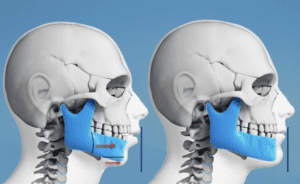What you need to know about JAW SURGERY

Some cases would certainly benefit from having jaw surgery. Have you been advised that you need jaw surgery?
Here is some information that will help with your decision process:
Jaw surgery is technically referred to as orthognathic surgery. It is a specialist field that combines two specialities; the teeth straightening speciality technically known as orthodontics and oral and maxillofacial surgery. The two specialities work together so that they bring about a correction to both your bite known as occlusion and your facial profile as this is not addressed with braces only. At the consultation stage, and even before the surgery you will have a chance to discuss the surgery and the jaw movements so you bring more external appearance change or less, depending on your desires.
In some cases, braces on their own are not powerful enough to correct your bite. The braces do not alter your facial profile. If your bite needs changing beyond the scope of braces or you would like alteration to your profile, jaw surgery will be recommended. The braces phases at the beginning and towards the end will ensure that your bite is even and the teeth are coordinated well.
If you have an overbite the surgery will mostly be aiming at bringing the lower jaw forward in line with the top jaw whilst if you have an underbite the top jaw will need to move forward in line with the lower jaw. You might also benefit from having both jaws moved for better results.
The following questions are the more commonly asked questions that might help you further with your decision and help you decide on how you would like to proceed.
Q: What are the stages of treatment?
A: Classically, you will have 3 stages:
- braces before the surgery,
- the surgery itself and
- the final stage is the last phase of brace treatment following surgery.
Q: How many appointments will I need?
A: You will need regular appointments to visit the orthodontist during the first and last phases of treatment typically every 4-8 weeks
For the second phase, the surgical treatment, you will need to meet the surgeon for 1 or 2 visits so that your surgical details are ironed out beforehand.
Q: Do I still need to see my regular dentist?
A: Always. You need to ensure that the regular visits to your regular dentist are kept to exclude any decay or gum disease during treatment. When you are registered with your regular dentist, they can quickly pick up on any treatment that surfaces and can be dealt with speedily. This will also insure that there aren’t any delays in your treatment.
How long will the overall treatment take?
On average, it takes 24 – 36 months however we have treated cases in much less time. This will mostly depend on how much tooth movement is needed before and after the surgery.
Q: What type of brace will I need to wear?
A: At Ely Smiles, we have been successful at providing jaw surgery with fixed braces and clear aligners.
Q: How will the operation be done?
A: The jaw surgery is carried out inside the mouth whilst you are asleep. You will not have any scars on the outside of your face.
Q: How long is the recovery period:
A: During the first 4 to 6 weeks you will be on a soft diet until your jaw bones heal. It would be best to take the first 3-4 weeks off work unless you are comfortable to work from home.
In case you are having one jaw surgery, most often you will need to stay at the hospital for 1 night whilst if you have surgery on both jaws, you will need to stay at the hospital for 2 nights.
Q: Will I look very different after the operation?
A: The treatment will bring about changes inside and outside the mouth. Your profile will look different however you will be completely recognisable. We would be aiming at giving you a facial profile without any size discrepancies between the two jaws. The surgery will focus on the jaw that is causing the most discrepancy in your profile.
If you would like to organise a face-to-face consultation we suggest you call us on 01353 667 200 or by email at info@elysmiles.com or by using WhatsApp at +44 7447 767756








